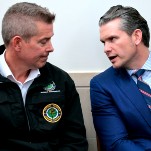What Do You Wish You Learned In Sex Ed?
LatestThe long dominance of abstinence-only sex ed in this country has made any program that even mentions condoms look pretty damn good. But what if your teachers could have taught you what you really needed to know about sex? What would you have wanted them to say?
Helpful, truly comprehensive sex ed isn’t just a liberal pipe dream. In this weekend’s Times Magazine, Laurie Abraham profiles Sexuality and Society, a course taught by Al Vernacchio at the private Philadelphia high school Friends’ Central. Vernacchio doesn’t just teach kids about contraception and STDs. He also discusses something that’s become a taboo topic: pleasure. He’s taught his students that many women don’t orgasm through vaginal intercourse, encouraged them to think about ways sex could engage all five senses, and got them talking about the pros and cons of different types of relationships. Abraham quotes this representative lesson:
-

-

-

-

-

-

-

-

-

-

-

-

-

-

-

-

-

-

-

-

-

-

-

-

-

-

-

-

-

-

-

-

-

-

-

-

-

-

-

-








































